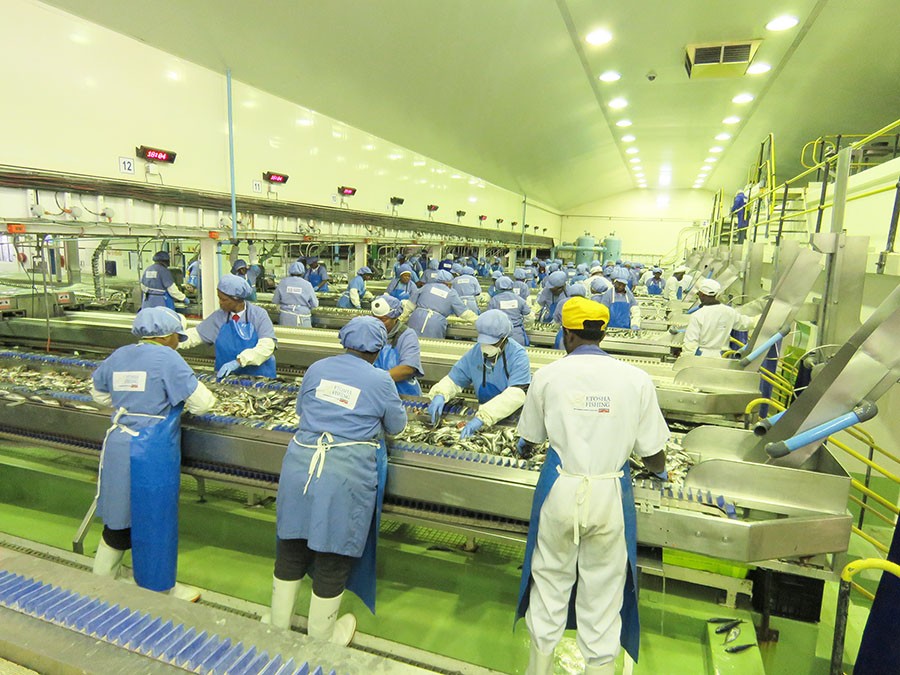Etosha sustaining jobs despite challenges

During the past five years Etosha Fishing has endured the most challenging times in the history of the company, however, has managed to remain operational and sustain employment for its seasonal workers, although on a limited basis.
“Due to a shortage of fish for processing in recent years, Etosha Fishing was forced to employ workers on a rotational basis, which is not ideal. However, it gave everyone a fair chance to earn something instead of reducing the number of workers,” says Etosha Fishing Managing Director Nezette Beukes. She highlights that as from February this year, the company started with double shifts on a trial basis to give all employees the opportunity to work simultaneously. The challenge remains that in the absence of raw material to process, the company cannot create employment when there is no fish to process.
“I am grateful to be earning an income,” says Monica Hoes, Hygiene Supervisor who has been with Etosha Fishing for 19 years. Sylvi Shuudifonya, a fish packer employed for seven years, also expresses his gratitude: “Etosha Fishing provides me with an income which allows me to look after my family.”
“Working for Etosha is a dream that came true. Since I came to Walvis Bay, I had a desire to work for Etosha Fishing. It makes me proud to work here because this a Namibian factory and a number one factory in canning in our country. It is where I feel that my efforts are not in vain because this is a company that is still feeding the nation even in hard times. I feel proud because I am contributing to Etosha’s legacy, and my hope is that it will remain operational for the next generation to carry-on the good work,” says Valens Morning Niinda, a forklift driver that has been employed with Etosha Fishing for the past four years.
The catching and canning of pilchards have traditionally been at the core of the company’s business. Since the pilchard moratorium was introduced in December 2017, Etosha Fishing had to stop operating daily double shifts for wet fish processing, hence limiting employment and income for seasonal employees. Although the pilchard moratorium came to an end in 2021, the ban on the catching of pilchards remains in place. The first pilchard surveys were conducted in October 2021 and the Ministry of Fisheries and Marine Resources is yet to make an official announcement on the matter.
Etosha Fishing remains committed to continuously seek ways of keeping the company afloat to sustain jobs. However, the situation has become even more difficult due to the challenges brought on by Covid-19 during the past years, including price increases and port congestions. This was compounded by poor international pilchard catches. As a result, the cannery was only operational for a limited number of days in 2021.
Currently Etosha Fishing sustains operations through the importation of frozen pilchards for local canning through its main shareholder, Oceana Group. This comes at an extremely high cost to the company due to a fluctuating exchange rate and the additional expenses associated with the importation of raw materials and consumables. As a result, the company has suffered substantial losses since 2018. Etosha Fishing only managed to remain operational during the past years as a result of the sale of its purse seine vessels and the retrenchment of some of the permanent and seagoing staff in 2019 to streamline operations.
Throughout the past years the management of Etosha Fishing has consulted and maintained good relationships with the Ministry of Fisheries and Marine Resources and labour unions to seek out means of overcoming challenges to avoid the closure of the company and ultimately job losses.
Until recently, Etosha Fishing did not have its own horse mackerel right; however, however a company within the Etosha Fishing group was granted a new horse mackerel right in 2021 and was subsequently awarded a limited quota to provide some relief to the situation. To ensure sufficient volumes for processing, Etosha Fishing must still buy raw material from other right holders at unsustainably high prices.
Established in 1940, Etosha Fishing is one of the oldest operators in the local fishing industry and is the only remaining operational cannery in Walvis Bay. The only other cannery closed in 2016 as a direct result of the pilchard moratorium and hundreds of jobs were lost.
 During the past five years Etosha Fishing has endured the most challenging times in the history of the company, however, has managed to remain operational and sustain employment for its seasonal workers, although on a limited basis.
During the past five years Etosha Fishing has endured the most challenging times in the history of the company, however, has managed to remain operational and sustain employment for its seasonal workers, although on a limited basis.